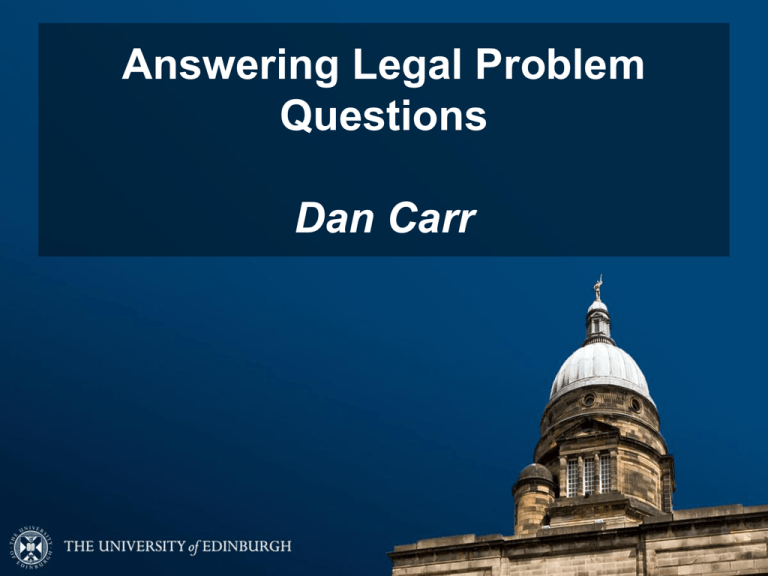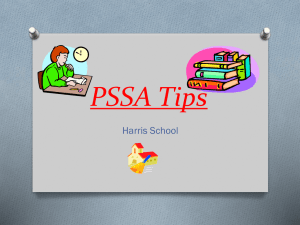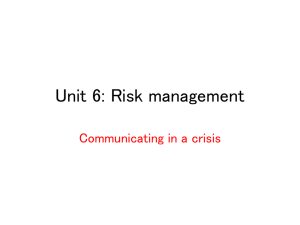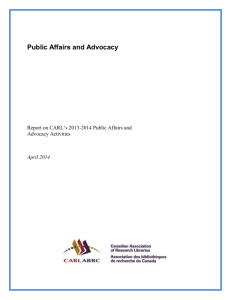Answering Legal Problem Questions
advertisement

Answering Legal Problem Questions Dan Carr Introduction • No magic formula • Examiners are looking to see how your judgment and knowledge are manifested in your answer • We don’t expect a standard format for answers • Guidance possible—what are we testing and looking for? Plan for today ① Tales from feedback ① Tips and advice ① Discussion of examination questions Tales from feedback... • The following comments are based on a true story... • Today you should be thinking about:- how do they relate to exam practice? do they make sense to you? do they accord with your experience of exams? what do you think they are asking you to do? (Very) basic examination requirements “Many students did not indicate on the front cover of their script which questions they had answered. Please remember to do so in future.” “Please cross out your revision.” “A number of students did not follow instructions and failed to write their answers in the order they were asked to do so in the exam books... and some even put incorrect numbers in the script book for questions they were answering.” (Very) basic examination requirements “A number of students did not complete the correct number of questions. I counted 15 scripts which fell into this category. Please answer the correct number of questions; if you do not, you are already moving towards a failure.” Timing is (almost) everything “Of the scripts which did not pass, some had not actually completed every question. Timing is always tricky in problem-type exams, but it is terribly important to ensure that something is written for each question and each part of each question.” What is the question? “The one obvious major problem shared by many papers was failure to answer the question asked. This could be either because the candidate had not read the question carefully, or because the candidate had a prepared answer on what he/she perceived to be the “topic”, which was then trotted out with little or any attempt to make it fit the question.” Addressing the question “It is important to read the question and answer it and not see it as consisting of a few key words on which you then write everything you know. Precise knowledge carefully used is important.” “Stick to the issues in the question. Many students went off on tangents (most of which were legally sound) that were irrelevant to the issues raised in the question, and, consequently, did not receive marks.” Addressing the question “We are rarely going to ask you to tell all you know on a subject. Remember also that we will often ask you about something uncertain; we want to see how well you deal with the material.” “Some students do not apply the law to the facts in some cases. They simply state the law or state the facts. The failure to apply the law demonstrates a lack of understanding of the law in the area... One particular problem with technique is writing conclusions without justification. Another is simply repeating huge chunks of the question with no law in the middle of the repetition. Please don't do this. I wrote the question and you can assume have some familiarity with its content.” Answering the question “There were a lot of issues to address. Students pick up more marks, overall, by addressing each one, rather than spending too much time on some issues and leaving others out completely.” “The exam is not a memory testing exercise, though you need to have knowledge; but it is intended to focus on how you apply that knowledge to answer questions asked.” “There is no need to rehearse the facts of the question at the start of the answer. This wastes time and gains no credit.” Answering the question “Some answers did not make the grade because there were simply not specific enough. It is important to identify the precise basis on which liability is established. You will not get marks for the vague assertion that “... liability” arises, or that X is “liable to pay damages” unless you indicate exactly why.” “In the problem questions those students who followed the order of the legal questions raised in the text did better than those who answered out of sequence. The danger of starting an answer out of sequence is that parts of the question may be ignored or forgotten and this happened in a number of cases. It is better when answering problem questions to work systematically through them from start to finish.” Using authority “Always cite statutory references or case law as authority for propositions. If you can’t remember the name of a case, a one-sentence description will suffice. Don’t waste valuable time and effort writing an entire paragraph on the facts of a case.” “Credit was given where students identified the legal principles from the case law, analysed those principles and then applied those principles to the facts in the question. It is also essential to identify and apply the relevant sections of the relevant legislation.” Style and structure “Finally, try to avoid formulations such as “I believe” or “I feel”. For present purposes the examiners would like you to tell them what the law is, not what you “feel” it should be.” “[S]ome students attempted to cite legal authority in footnotes that were hard to read. In answering exam questions there should be no need to use footnotes, the authority should be cited in the main text.” “Some students resorted to note form in their answers, simply putting down odd words and numbers on the page without any explanation as to what they represented. This is unacceptable because students need to make clear what they are saying, demonstrating the logic behind it, and not leave it to the examiner to divine the meaning of the symbols that they have written on the page. Tips and advice: preparation • Ensure that your notes are orderly and complete • Read your statutes before the exam • Know where the examination is and be there in good time • Know the format of the examination • Talk to friends • Regular routine Tips and advice: in the exam hall • Marking statutes: NO • Write legibly • Pens, calculators, dictionaries etc • Ignore other candidates • Questions attempted • Answer all the questions Tips and advice: identifying the question • READ EVERY WORD OF THE QUESTION • Identify the key facts • Few, if any, facts will have no significance in an exam (cf life in practice) • GIVEN FACTS ARE CONCLUSIVE • Look for the steer • Once identified the facts, think about using FLAC Tips and advice: substance • RELEVANCE, RELEVANCE, RELEVANCE • FLAC: • FACT • LAW • APPLY • CONCLUDE Tips and advice: style and structure • Structure and style: • FLAC • Okay to say ‘need more information’ • If unclear, give all possibilities according to the strength of legal argument • DO NOT MAKE IT UP • ‘Advise X’ • Divided/composite questions • Beware levity Tips and advice: authority • MUST use authority • Don’t copy out swathes of the statute book • Remember cases augment statutes • Outline facts briefly • No ‘empty cases’ • Please don’t make up cases—you look like an idiot • Remember the hierarchy of authorities • “Dr Carr said in the lecture that X was the law”— don’t do this EXTRACTS OF SAMPLE PROBLEM QUESTIONS • Advise Scotship on whether there is a contract with Panton. • Advise Baxendales on their prospects in an action of damages for breach of contract against Czarnikow. (Ignore possible Sale of Goods Act aspects to this problem and focus only on the general law of contract.) • Discuss the issues of delictual liability that may arise from the publication of the above article. EXTRACTS OF SAMPLE PROBLEM QUESTIONS Carl approaches you as his solicitor asking: (a) whether Carl has a valid contract with Petronella (giving full reasons explaining your view on this point and applying the law to the facts); (b) whether Carl could raise an action of specific implement against Petronella; and (c) if it transpires that Carl has no contract with Petronella, does he have any action against Archie? Advise Carl. Please express your view on all parts (a), (b) and (c) regardless of your answer for (a). The judge may not agree with your answer for (a) and you must prepare Carl for all eventualities. EXTRACTS OF SAMPLE PROBLEM QUESTIONS Claire owns a fish farm. After a storm, the farm floods. Claire’s fish escape into a stream. They swim downstream. Two of them are caught by Bruce who owns a house downstream and enjoys angling from his back garden. Bruce does not know that the fish were reared in the fish farm. He places one in his freezer. He sells the other to Jennifer. She hears about the flood on the fish farm on the local radio. Worried in case the fish originated from the farm, she rushes and sells it to Lorraine, who is in good faith. Who owns the two fish? [10 marks]











